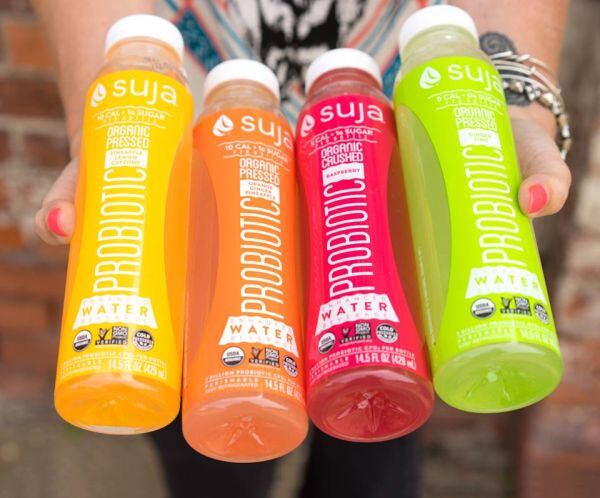Speaking to FoodNavigator-USA as Uncle Matt’s Organic – which has also made a recent move into the probiotic water/juice segment – was acquired by Dean Foods, Church said:
“We’re still considering doing a kombucha product and have been evaluating the space for some time, but if we do it, we want to do it in a way that we can control the alcohol and sugar and be consistent with our brand and very transparent, as we’d want to do something non-alcoholic.
“The whole fermented beverage segment is on fire, whether it’s kombuchas or drinking vinegars or products with probiotics,” said Church, who brought out pressed probiotic waters in March 2016 and drinking vinegars (combining water, apple cider vinegar, cold pressed fruit/veg, stevia, and a range of on-trend ingredients from balsamic vinegar to coconut nectar) in the fall of 2016.
Consumers want lower sugar and more functionality
Suja’s 5-10 calorie pressed probiotic waters - which contain water, fruit juice or puree, and Ganeden’s BC30 probiotic strain – are demonstrating “really nice growth,” while the drinking vinegars are also performing well as consumers continue to look for beverages with “lower sugar and more functionality,” added Church.
“You’re seeing a variety of different fermented products out there and consumers see that when you ferment something you’re able to unleash some of the super beneficial organic acids and phytonutrients that you wouldn’t naturally be able to get.”
According to SPINS, retail sales of refrigerated kombucha and fermented beverages surged 28% year-on-year to $429m (natural, specialty, conventional multi-outlet) in the 52 weeks to May 21, but with household penetration still very low, there is still significant opportunity for growth.
The data covers MULO (conventional, multioutlet), natural, and specialty gourmet channels in the 52 weeks to May 21, 2017. The MULO channel logged the fastest growth at 36.2% YoY, compared with the natural channel at 14.8% and the specialty gourmet channel at 15.9%.
According to SPINS: "The REFRIGERATED KOMBUCHAS & FERMENTED BEVERAGES subcategory not only includes refrigerated and shelf stable RTD kombucha but also includes other fermented beverages such as water kefirs, coconut water kefirs, and kvass. Dairy kefir is not coded in this subcategory. Many of the products in this subcategory feature probiotics. Kombucha and other fermented shots are coded here as well. Switchels are coded in another subcategory."
Amazon/Whole Foods deal
Asked about the ramifications of Amazon’s deal to acquire Whole Foods Market, Church predicted it would not make much difference in the short term.
The deal, he speculated, was likely more about giving Amazon opportunities to plug into Whole Foods’ infrastructure and brand longer term (using stores as testbeds for new technology, click and collect locations for Amazon orders, or fulfilment locations for AmazonFresh orders) rather than ‘fixing’ short to medium term challenges at Whole Foods.

“My personal opinion is that they will try and use this to leverage Whole Foods’ distribution points to grow the Amazon Fresh business and leverage the Whole Foods brand name from a home delivery standpoint.”
As for the deal’s impact on CPG brands such as Suja, it is too early to speculate beyond the fact that an Amazon takeover is probably preferable to a takeover by a large grocery chain, he claimed.
What does seem likely, however, is that the deal will galvanize other retailers into stepping up their grocery ecommerce efforts, he predicted.
While the Amazon acquisition has prompted a huge amount of speculation about wholesale changes at Whole Foods, it was also worth noting that the retailer has already made some significant changes in recent months, he said.
“I think Whole Foods is right to move to more centralized buying and sharing their numbers with Nielsen and letting brands help them with category management, for example.”
